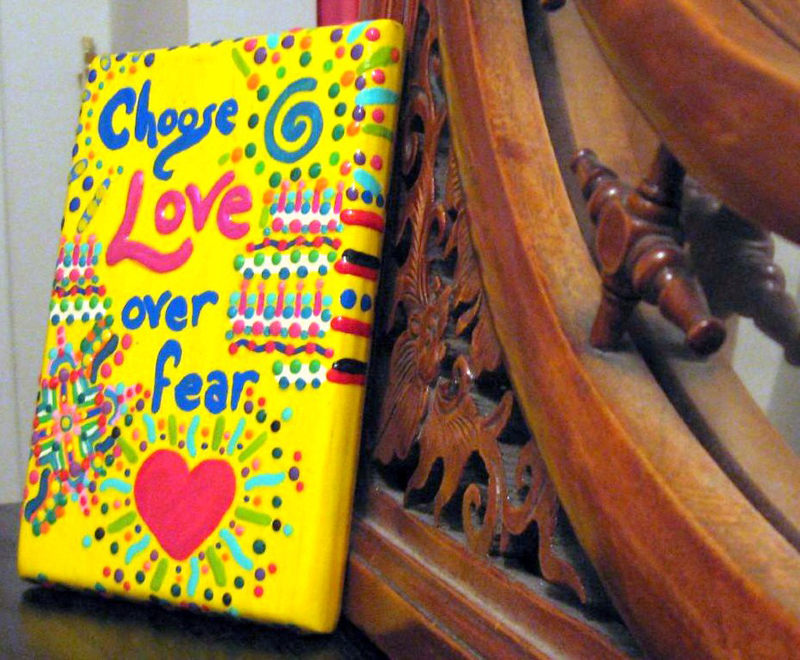written by Dani Gabriel
I have had a long and sometimes treacherous journey with gender. As a young butch lesbian, I imagined myself growing up to be a man. As a femme in my 20s, I felt fierce in a way that was both inside and outside gender stereotypes. As a mom in my 30s, I stopped talking about gender, and queerness, and what it all meant to me. Mostly I was just trying to manage the daily challenges, but also, society strips people who are mothering of a lot of agency. Then, when my kid was 9, he went through a gender transition. As part of marking and honoring this event, our priest the Rev. Liz Tichenor wrote and officiated at a blessing and renaming for my son.
This was transformational for our whole family, and for our whole church in a lot of ways. My son said “I feel like the luckiest boy in the whole world.” For me, I felt free to start asking some of the questions I’d been putting off for almost a decade: how did I identify? How did I want to be referred to? It was a joy, learning from my children and their generation about all the possibilities they are creating, and feeling supported by my church community. I was in the ordination process, however, and had some hesitation as to how I would be received in the wider church.
I came to solidly identify as nonbinary, and began to ask people to use they/them pronouns. For me this really reflects my experience of many genders over time, as well as a persistent feeling of not fitting “male” or “female” completely. I have met a lot of resistance: not from folks with hateful rhetoric, but from folks who really don’t want to be bothered to do something new. I go through waves of frustration, but still overwhelmingly feel joy at the possibilities that have opened up for me.
Then finally, last year, I was weeks away from being ordained in the Episcopal Church. Classes and internship were behind me, all the interviews with committees and commissions were done. A date had been set, I had ordered the collared shirt and suit. All that was left was picking the readings for the day and the design of the service itself.
I had read over the ordination of a deacon many, many times. I heard my call clearly in it. But there was still one way, going over the words, that I didn’t see myself reflected. Throughout the ordination there is reference to he or she, to my brother or sister. This narrow reflection of gender felt profoundly uncomfortable to me.
But I was afraid to ask the staff at the Cathedral to change the service. Despite the profound acceptance I have felt in the church, there are lots of people who would just prefer not to deal with language they’re uncomfortable with. Plenty of people ignore my pronouns. The people who don’t want to do something new sometimes even argue the issue. There is a general sense that my identity and the pronouns I use are, while not abhorrent, an inconvenience. There is a feeling I get that it would be preferable if I would just disappear, and sometimes I feel myself doing that, slipping away.
There’s also the very real truth that Episcopalians want things done “correctly.” Changes to liturgy, even small ones, are a big deal. When you’re messing with “the way we’ve always done things” the situation can get ugly. It is pretty groundbreaking to bring in new pronouns and new ways of referring to our siblings. The Presiding Bishop has expressed an openness, as have many clergy I know, but there are still plenty of opportunities for conflict and discomfort. Sometimes tradition comes before respecting the dignity of a human being, even though that, of course, is the heart of our Baptismal Covenant and our tradition.
So I had to decide whether to make an issue out of it. I wrote and rewrote my email. I asked, simply, to be referred to with they/them pronouns and as “sibling” throughout the service. I was met with a “we’ll get back to you,” and I wondered what would happen. Eventually I was told, in a very supportive way, that my request would be honored. But I didn’t know what that would look like. And I didn’t know if it would get forgotten, as my pronouns so often do, in the chaos of the day.
The staff at Grace Cathedral did an amazing job. Instead of “brothers and sisters” they used the phrase “Companions in Christ,” a gorgeous invention, throughout the service. When it was my turn to kneel in front of the Bishop I wondered if he would remember. Bishop Marc Andrus acted like he used they/them pronouns at ordination all the time, like it was totally normal, like it was nothing.
It was not nothing.
In that moment I felt wholly seen and recognized, like I could truly follow my call in the Church and in the world. It was stunning. The power of the spirit was dizzying, and I rose changed. Later a number of people asked me about the language of the service. They were excited. To me, knowing that the moment that meant so much to me also had great meaning for others, made it even better.
During the peace my son gave me the biggest hug ever. When I went back up the steps for the rest of the service my stole was falling off and I was laughing. I knew that in this moment my son was also continuing to see the love and possibilities that the church holds for him and for all transgender, nonbinary, and gender nonconforming people. I am thrilled to now be helping the church live into those possibilities in my ministry.

